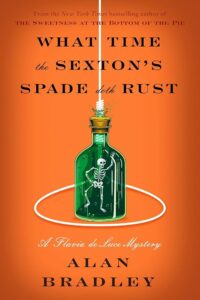Flavia DeLuce #11
 If you haven’t read this series, and I must admit that I have not, you are missing a treat. Flavia is the world’s most precocious 11-year-old chemist and poison expert. A British orphan with very adult British attitudes in 1950s England, Flavia nonchalantly deals with post-war rationing, dead bodies, poisons, spies, kidnapping, and murder – along with a couple of surprises I won’t spoil.
If you haven’t read this series, and I must admit that I have not, you are missing a treat. Flavia is the world’s most precocious 11-year-old chemist and poison expert. A British orphan with very adult British attitudes in 1950s England, Flavia nonchalantly deals with post-war rationing, dead bodies, poisons, spies, kidnapping, and murder – along with a couple of surprises I won’t spoil.
The plot revolves around the death of a neighbor, Major Greyleigh, who apparently died from eating poison mushrooms cooked by Flavia’s housekeeper, Mrs. Mullet. Surely she wouldn’t murder someone, even accidentally! Major Greyleigh was once a hangman. Could he have been murdered by a family member of someone he killed in the line of duty? Investigating the murder leads Flavia to a nearby American airbase with unexpected and surprising complications.
The fun part of the story is watching the intellectual Flavia deal with other characters including devoted servant Dogger, her annoying cousin Undine, and the intellectually inferior police. Flavia’s ego is hilariously over the top: “I have to admit that I’d been praying for ages to God, the Virgin Mary, and all the saints for a jolly good old-fashioned mushroom poisoning. Not that I wanted anyone to die, but why give a girl a gift of science—of chemistry, to be precise—such as mine without giving her the opportunity to use it?”
I found Flavia’s narration amusing but also sometimes found it hard to suspend my disbelief. Could an 11-ish child really have such an adult understanding of the world, the ability to outthink everyone around her, and the confidence to stand up to adult authorities whom she must confront? If this were a children’s book, I’d expect this, but in a book clearly written for an adult audience, it’s harder to accept. It could be that I’m taking the book too seriously or that not reading the previous books has put me at a disadvantage. I suspect long-time fans adore this outing with their old friend Flavia.
One aspect softened my attitude towards Flavia. It’s now 1953 and she is feeling the first hints of adolescence which conflict with her intellectual personality. She is puzzled by feelings that sometimes confuse her and distract her thinking. By the end of the books she thinks she has come to terms with the idea of these changes, in her own not-so-humble way: “I realized fully, for the first time ever, who I am. I am a new person. I am the Phoenix reborn. I am Flavia de Luce: a living and vital mushroom growing out of the dead wood of the de Luce family. It is going to be quite a life.”
Indeed! I can hardly wait for the next book. Until then, I have the rest of the series to read, starting with The Sweetness at the Bottom of the Pie.
I must admit that the title puzzled me until I found the quote on the Scottish Poetry Library web site:
“At the End”
When my last song is finished,
And my heart has lost its fire,
When passion is diminished,
And dead is all desire,
I pray with Death there’s no belating,
To keep the undertaker waiting.
I have no dread of dying,
But, O, I fear to think
That long I’ll be kept lying
Worn out upon the brink,
What time the sexton’s spade doth rust,
And he must drink his ale on trust.
I suspect British readers will recognize the quote and understand the context without having to look it up like I did! — Cathy Akers-Jordan